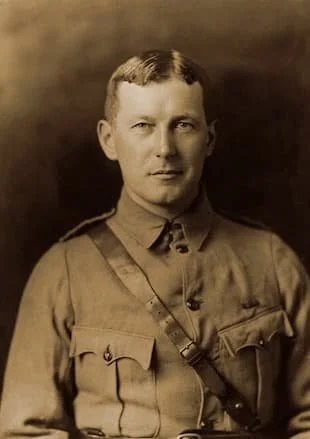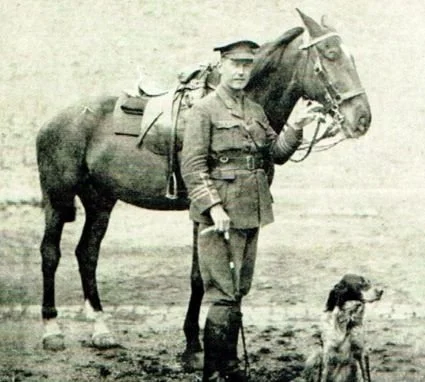Remembering…Lieutenant Colonel Dr. John McCrae
Born This Day Series, Social Media Content
John McCrae was born in Guelph in 1872, into a Scots Presbyterian military family. He joined the cadets at 14, and enlisted at 17 in the Militia field battery commanded by his father. Then he went to the University of Toronto, taught at the Ontario Agricultural College and fell in love. She died; he went to medical school.
At university, he was Lieutenant in the Queen's Own Rifles of Canada, and he became a published poet. He led a battery of the Canadian Field Artillery during the Second Boer War then, as Major McCrae, became resident pathologist at Montréal General Hospital. In 1908, he was appointed physician to the Royal Alexandra Hospital for Infectious Diseases.
He was a respected teacher and doctor, a popular fellow (a friend of Stephen Leacock) and a dedicated writer—he was a member of Montreal’s Shakespearean Club and the Pen and Pencil Club. He was also an avid outdoorsman, acting as expedition physician for Governor General Lord Grey canoe trek from Lake Winnipeg to Hudson's Bay.
When war was declared on August 4, 1914, McCrae was one of the 45,000 Canadians who immediately signed up. He was appointed a medical officer with the First Brigade of the Canadian Field Artillery, and second-in-command. Just before he left, with his horse Bonfire, he wrote “I think every bachelor, especially if he has experience of war, ought to go. I am really rather afraid, but more afraid to stay at home with my conscience.”
McCrae was posted in the trenches at Ypres, in the northern region of Belgium known as Flanders. The month-long Second Battle of Ypres remains among the war’s most infamous; despite the German’s use of chlorine gas, Allied troops fought relentlessly, to a loss of 70,000. McCrae wrote of it as “…a nightmare. For seventeen days and seventeen nights none of us have had our clothes off… in all that time, gunfire never ceased for sixty seconds. Behind it all was the constant background of the sights of the dead, the wounded, the maimed, and a terrible anxiety lest the line should give way.” To try to cheer his family, he signed his letters home with Bonfire’s hoofprint.
On May 2, 1915, McCrae’s friend, the young engineer Lieutenant Alexis Helmer, was killed. McCrae attended his burial and noticed the wild poppies blooming between the crosses in the cemetery. The next day, he wrote “In Flanders Fields”. It was published in Punch in December and immediately became the poem representing all who had fought, and continued to fight, in the First World War.
McCrae, now Lieutenant Colonel, was transferred to No. 3 Canadian General Hospital in France where he was Chief of Medical Services. The hospital was the site of ruins of the Jesuit College at Boulogne, a 1,560-bed facility covering 26 acres. Deluged by the wounded, McCrae became bitter and disillusioned. He felt terrible guilt and insisted on living in a tent until he was ordered back into quarters. When ordered to take time off, he spent his time riding the countryside on Bonfire, his adopted dog Bonneau in the saddle.
By 1917, McCrae’s life-long problems with asthma had returned. Bronchitis became pneumonia. On January 23rd, he became the first Canadian appointed physician to the First British Army. He died on January 28th.
John McCrae was buried with full military honours in Wimereux Cemetery, just north of Boulogne. Bonfire and Bonneau led the procession. Every year, thousands of people visit his grave, bringing flags, poppies and, occasionally, a card signed with a hoofprint.
We are the Dead. Short days ago
We lived, felt dawn, saw sunset glow,
Loved, and were loved, and now we lie
In Flanders Fields.

